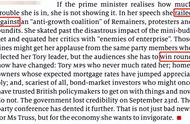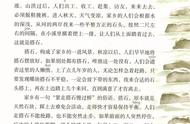Word of the Day : May 19, 2023
censure
谴责;责难;指责;抨击
verb /SEN-sher/ [ˈsenʃər]
What It Means
To censure someone is to formally criticize or reprimand them for an act or failure, To censure 意思是批评或谴责他们的失败,尤其是从权威的位置。
CENSURE in Context
“Aware of recent occurrences in Deltona, whose City Commission censured one of its members for naming a private citizen and posting insults and vulgar comments about him on social media, [Mayor Gary] Blair said Orange City should declare such behavior out of bounds.” — Al Everson, The West Volusia Beacon (DeLand, Florida), 9 Mar. 2023
“最近发生的德尔托纳事件,其市委员会谴责其一名成员在社交媒体上指名道姓并在社交媒体上发表侮辱他的粗俗的评论,[市长加里]布莱尔说奥兰治市应该宣布这种行为超出范围。”
He was censured by the committee for his failure to report the problem.
他因未能报告问题而受到委员会的谴责。
Did You Know?
If you’re among those who confuse censure and censor, we don’t blame you. The two words are notably similar in spelling and pronunciation, and both typically imply acts of authority. It’s no surprise that they share a common ancestor: the Latin cēnsēre, meaning “to give as an opinion.” But here’s the uncensored truth: despite the similarities, censure and censor are wholly distinct in meaning. Censure means “to fault or reprimand,” often in an official way; censor means “to suppress or delete as objectionable.” So if you’re talking about removing objectionable content from a book or banning it from a library, the word you want is censor. And you can use censure to talk about criticizing, condemning, or reprimanding those pushing for censorship.
如果您是容易混淆 censure 和 censor 这两个词的人,我们不会怪您。 因为它们在拼写和发音上非常相似,并且都通常暗示权威行为。 毫不奇怪,他们有一个共同的祖先:拉丁语 cēnsēre,意思是“to give as an opinion「给出意见」”。 但这是未经确认的事实:尽管有相似之处,但 censure 和 censor 在含义上是完全不同的。 Censure 的意思是“to fault or reprimand「指责或谴责」”,通常是以官方的方式; censor 的意思是“ to suppress or delete as objectionable 「控制或删除令人反感的内容」”。 因此,如果您谈论的是从一本书中删除令人反感的内容或将其从图书馆中取缔,那么您要用的词就是 censor。 您还可以使用 censure 来讨论批评、谴责或谴责那些推动审查制度的人。
Name That Synonym
Unscramble the letters to create a synonym of censure: PEROEVR.
reprove
,













